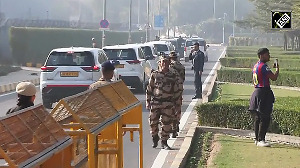While officials in both nations have described the historic agreement as a centerpiece of American-Indian relations, to many Indian-Americans, the plan is something more personal: a confirmation of India's emergence as a global power, the Times said.
'They see the increasingly contentious battle in Congress as a unique opportunity to demonstrate their budding political influence in their adopted homeland,' and are spending heavily on lobbying, campaign contributions and public relations to persuade Congress to approve the deal, said the report.
Is US opposition trying to scuttle N-deal?
'Indian-Americans, a small but fast-growing, affluent and well-educated group, are not new to lobbying in Washington. But the proposed nuclear pact has energized them like nothing before,' it said.
"This is the chance to show that the community has matured and can translate that into political effectiveness," it quotes Sanjay Puri -- an information technology executive and chairman of the US-India Political Action Committee, or USINPAC, one of several Indian-American political groups that are working on the issue -- as saying.
N-deal's supporters woo opposition
According to the article, 'the Bush administration is now pushing for approval in Congress, where a vote is not expected until at least the fall and the outcome is far from certain.'
USINPAC is organizing a fund-raiser this month for Senator Hillary Rodham Clinton, whose support is viewed by Indian-American leaders as crucial to winning broader Democratic backing for the plan. Senator Clinton, co-chairwoman of the Senate's 39-member India Caucus, is yet to take a position on the deal, the Times said.
Community leaders plan Washington rally
However, 'some community members question whether Indian immigrants should be putting so much of their political energy into fighting for the contentious proposal,' it said.
Rohit Tripathi, an electrical engineer in Maryland and president of Young India, a policy group, told the Times that he did not oppose the deal, but doubted it would provide meaningful energy independence for India.
"I think when an immigrant community wants to assimilate themselves into the political process, they latch onto whatever they can find," he said.
'To help overcome opposition in Congress, the Indian government has signed contracts worth $1.3 million with influential Washington lobbyists, including Robert D Blackwill, a former American ambassador to India for the Bush administration. The Indian government has also retained former Senator Birch Bayh of Indiana,' says the article.
While foreign governments and individuals are barred from making campaign contributions, US-based organizations like USINPAC -- which is financed largely by donations from wealthy Indian-American doctors, engineers and other professionals -- are not.
USINPAC has contributed more than $200,000 to Congressional candidates over the last few years, and hosted nine fund-raisers and receptions since January, raising tens of thousands of dollars for key members of Congress, the Times said.
The United States-India Business Council and Indian American Friendship Council are also lobbying for deal.
Getting the issue approved is "a huge deal" for the Indian-American community, Representative Gary Ackerman, a New York Democrat who is co-chairman of the House Caucus on India and Indian-Americans, was quoted as saying.
"They're tripping all over each other to get behind this. On a scale of 10, this is probably a 15 for them," he said.
Complete coverage: The nuclear deal | Chats





